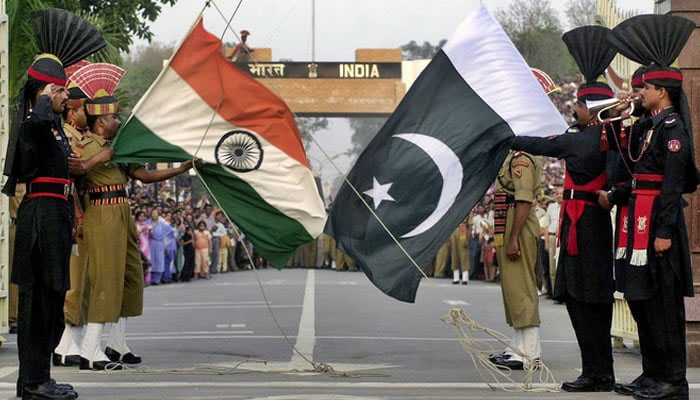IRS dialogue on Pakistan-India relations
Islamabad:A gathering of intellectuals and experts at a roundtable discussed challenges and opportunities for engagement between Pakistan and India following recent elections in both countries convened.
The gathering was convened by Institute of Regional Studies (IRS) in collaboration with Beaconhouse National University (BNU). Former Federal Minister for Information Senator Mushahid Hussain Sayed, Former Minister of Defence and Foreign Affairs Khurram Dastagir Khan, Former National Security Advisor, Gen Nasir Khan Janjua, and Former Finance Minister, Dr Salman Shah were the keynote speakers while former Minister for Information and Climate Change and the current Chairperson of Senate Committee on Climate Change Sherry Rehman spoke was the guest of honor.
Jauhar Saleem, President, IRS, and Mansoor Ahmed Khan, Director Beaconhouse Centre for Policy Research, opened the discussion by presenting an analysis of the state of Pakistan-India relations and posing a key question: what is Pakistan's current position regarding its relations with India and what steps should be taken next?
Prof Mujeeb Afzal, School of Politics and International Relations, Quaid-i-Azam University, said that the world is moving towards cooperation though also competing at the same time like China and United States. He opined that Indian Prime Minister Narendra Modi may review his policy towards Pakistan and pursue cooperation in order to attract Muslim voters as his BJP failed to get absolute majority in the Lok Sabha and had to form a coalition government. He observed that Pakistan should engage with India as cooperation could lead to $52 billion bilateral trade.
The panellists discussed different approaches for interaction with India-provided India adopted a more receptive and responsible stance—including formal dialogues, Track II initiatives or alternative backchannel methods. They also explored the possibilities for resolving Jammu and Kashmir dispute and other issues, fostering economic ties, and promoting normalisation between the two nations. Some also suggested enhancing ties with Afghanistan and fostering a more strategic approach with China. Some former diplomats also called for seeking assistance from Russia and the US to facilitate dialogue between Pakistan and India.
Much emphasis was placed by various speakers on bolstering Pakistan's internal socio-economic and military capabilities, as well as improving governance. The participants argued that an effective dialogue process between the two countries hinged on building an enabling environment to agree upon key areas of engagement addressing mutual concerns such as climate and water, while upholding Pakistan's stance on Kashmir. Regarding water negotiations, the importance of both sides honouring the Indus Waters Treaty was duly underlined.
Former diplomats Salman Bashir, Aizaz Ahmad Chaudhry, Tehmina Janjua, Lt Gen Asad Durrani, Shafqat Kakakhel, Chairperson BoG, SDPI, and academicians Dr Rifaat Hussain, Dr Zafar Nawaz Jaspal and Dr Shaheen Akhtar were included in the list of panellists.
-
 Blac Chyna Reveals Her New Approach To Love, Healing After Recent Heartbreak
Blac Chyna Reveals Her New Approach To Love, Healing After Recent Heartbreak -
 Royal Family's Approach To Deal With Andrew Finally Revealed
Royal Family's Approach To Deal With Andrew Finally Revealed -
 Super Bowl Weekend Deals Blow To 'Melania' Documentary's Box Office
Super Bowl Weekend Deals Blow To 'Melania' Documentary's Box Office -
 Meghan Markle Shares Glitzy Clips From Fifteen Percent Pledge Gala
Meghan Markle Shares Glitzy Clips From Fifteen Percent Pledge Gala -
 Melissa Jon Hart Explains Rare Reason Behind Not Revisting Old Roles
Melissa Jon Hart Explains Rare Reason Behind Not Revisting Old Roles -
 Meghan Markle Eyeing On ‘Queen’ As Ultimate Goal
Meghan Markle Eyeing On ‘Queen’ As Ultimate Goal -
 Kate Middleton Insists She Would Never Undermine Queen Camilla
Kate Middleton Insists She Would Never Undermine Queen Camilla -
 Japan Elects Takaichi As First Woman Prime Minister After Sweeping Vote
Japan Elects Takaichi As First Woman Prime Minister After Sweeping Vote -
 King Charles 'terrified' Andrew's Scandal Will End His Reign
King Charles 'terrified' Andrew's Scandal Will End His Reign -
 Winter Olympics 2026: Lindsey Vonn’s Olympic Comeback Ends In Devastating Downhill Crash
Winter Olympics 2026: Lindsey Vonn’s Olympic Comeback Ends In Devastating Downhill Crash -
 Adrien Brody Opens Up About His Football Fandom Amid '2026 Super Bowl'
Adrien Brody Opens Up About His Football Fandom Amid '2026 Super Bowl' -
 Barbra Streisand's Obsession With Cloning Revealed
Barbra Streisand's Obsession With Cloning Revealed -
 What Did Olivia Colman Tell Her Husband About Her Gender?
What Did Olivia Colman Tell Her Husband About Her Gender? -
 'We Were Deceived': Noam Chomsky's Wife Regrets Epstein Association
'We Were Deceived': Noam Chomsky's Wife Regrets Epstein Association -
 Patriots' WAGs Slam Cardi B Amid Plans For Super Bowl Party: She Is 'attention-seeker'
Patriots' WAGs Slam Cardi B Amid Plans For Super Bowl Party: She Is 'attention-seeker' -
 Martha Stewart On Surviving Rigorous Times Amid Upcoming Memoir Release
Martha Stewart On Surviving Rigorous Times Amid Upcoming Memoir Release




